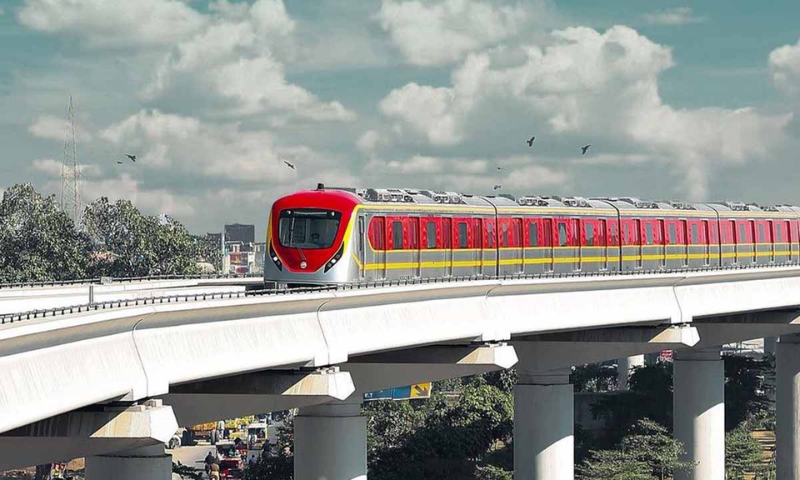HASNAIN AULAKH
The Orange Line Metro Train Project in Lahore, Pakistan, is a shining example of modern infrastructure, made possible through a historic collaboration between China and Pakistan under the China Pakistan Economic Corridor (CPEC). This groundbreaking venture symbolizes the unbreakable bond between the two nations, fostering economic growth and cultural exchange.
Recently, the Orange Line Metro Train achieved a remarkable milestone – 200 million passengers! To celebrate, Chinese Ambassador to Pakistan, Jiang Zaidong, joined locals on a ride, demonstrating his commitment to strengthening ties. At Anarkali Station, Ambassador Zaidong was accompanied by the Chinese Consul General in Lahore, Zhao Shirin.
In his address, Ambassador Zaidong praised Pakistan’s economic progress and improved living standards, attributing it to CPEC. The event was made even more special with gifts presented to the Ambassador by Orange Line Metro Train officials.
The Orange Line Metro Train Project in Lahore, Pakistan, has a fascinating history. Its foundation stone was laid in 2015, with an initial expected completion date of 2018. However, due to technical and legal hurdles, the project didn’t become fully operational until October 25, 2020.
This impressive infrastructure stretches 27.1 kilometers from Dera Gujran GT Road to Lahore Junction, traversing Mcleod Road, Multan Road, and Ali Town Raiwind Road, with 26 stations along the way. The electric trains operate at a speed of 80 kilometers per hour, utilizing modern signaling and communication systems to ensure safe distances and efficient travel. This enables the trains to accommodate approximately 2.5 million passengers daily.
The Orange Line Metro Train Project in Lahore, Pakistan, has a total cost of $1.65 billion, funded jointly by the Federal Government of Pakistan and the Government of China through soft loans. The project was executed by the Punjab Mass Transit Authority and China Rail, with the control and command center located at Dera Gujran, where trains undergo electric washing and physical fitness tests before being deployed.
The project employs a workforce comprising 3% Chinese and 97% Pakistani staff. Notably, the Orange Line Metro Train is part of the Lahore Metro system and operates as an automated rapid transit line. The Orange Line Metro Train has revolutionized Lahore’s transportation landscape, providing a reliable and efficient travel option for its residents.
The Orange Line Metro Train has transformed the transportation landscape in Lahore, providing citizens with modern and affordable travel facilities that meet international standards. This automated rapid transit line spans and its efficiency has been estimated at about 99.9 percent. The train’s fare is also remarkably affordable, set at PKR 40 to facilitate residents.
The project’s success has brought joy to the citizens, and it’s easy to see why. With the ability to carry 250,000 passengers daily, the Orange Line Metro Train has reduced traffic congestion and made commuting easier. Plus, its eco-friendly electric trains produce zero emissions, alleviating the city’s air pollution woes.
Looking ahead, plans are underway to expand Lahore’s transportation infrastructure with the Green and Purple Line projects. These initiatives will further enhance the city’s connectivity, providing residents with even more efficient and reliable travel options.
The Orange Line Metro Train project is a shining example of Pakistan-China cooperation, driving economic growth, infrastructure development, and people-to-people connectivity. This iconic project showcases the strength of their bilateral relationship, built on mutual trust, respect, and cooperation. The Pakistan-China friendship has withstood the test of time, transcending regional and global developments, and is considered an “all-weather strategic cooperative partnership”.
Their strategic partnership has led to numerous landmark projects, including the China Pakistan Economic Corridor (CPEC) and the Belt and Road Initiative (BRI). These initiatives have not only boosted Pakistan’s economy but also created thousands of jobs, addressed the country’s chronic energy crisis, and improved connectivity through infrastructure development.
The success of these projects demonstrates the iron-clad friendship between China and Pakistan, which has withstood the test of time. As Pakistan continues to navigate its economic and social development, China remains a trusted partner, supporting Pakistan’s sovereignty, territorial integrity, and security. Long live Pak-China friendship!

